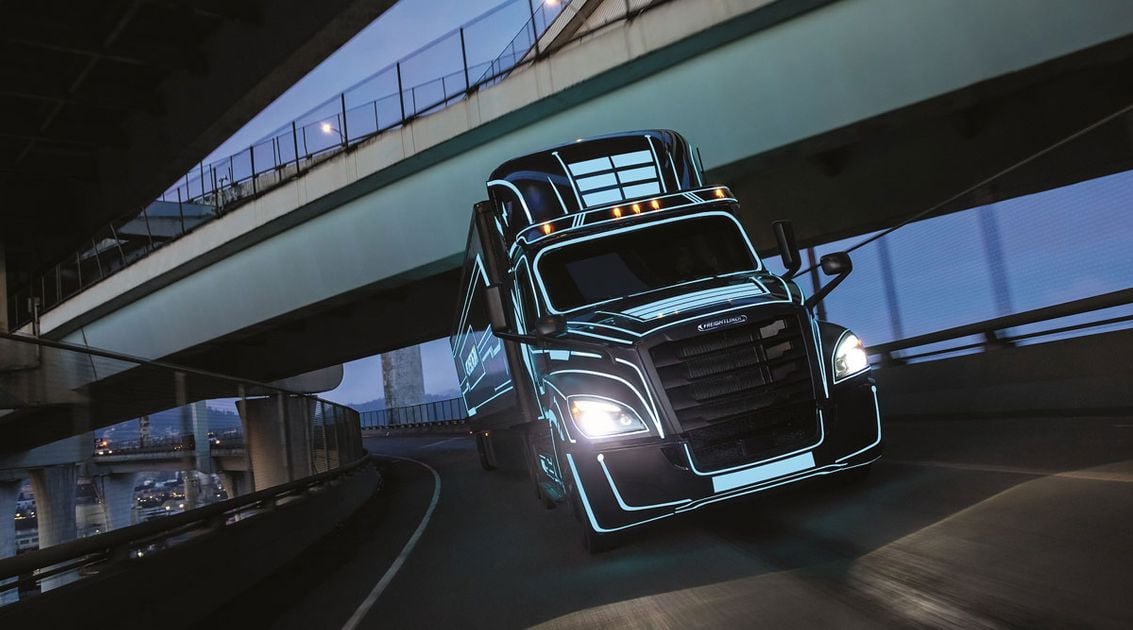
Daimler Truck North America already has the battery-electric Freightliner eCascadia in production. For the DOE SuperTruck 3 project, they’re working with university researchers on a fuel-cell-electric truck.
Photo: Daimler Truck North America
Daimler Trucks North America is tapping into the expertise of engineering researchers at Oregon State University developing a zero-emissions heavy-duty truck capable of regional and long-haul freight deliveries as part of the SuperTruck 3 program.
Yue Cao and Alan Fern of OSU’s College of Engineering will use advanced electrical propulsion and artificial intelligence research to create the power electronics, motor drive technology and energy management tools for a hydrogen fuel cell tractor with a 600-mile range, a 25,000-hour cell life and a payload capacity equivalent to that of a diesel truck.
Cao, assistant professor of electrical and computer engineering, and Fern, professor of computer science, have received $860,000 for their role in the four-year Daimler SuperTruck 3 project.
The work by Oregon State is part of $25.8 million awarded by the Department of Energy to Daimler Trucks North America for the third iteration of the DOE’s SuperTruck program.
The DOE Office of Energy Efficiency and Renewable Energy launched the SuperTruck initiative in 2009, and in 2015, DTNA and its project partners exceeded the program goals by designing a truck that demonstrated more than 115% improvement in overall freight efficiency over a 2009 baseline truck and achieved more than a 50% engine brake thermal efficiency improvement.
A number of innovative features from DTNA’s first SuperTruck design are available today in the Freightliner Cascadia, including enhanced aerodynamics, improved engine thermal efficiency, and powertrain integration technologies such as downspeeding, and predictive powertrain controls.
SuperTruck 2, which is to be revealed in 2023, is on track to achieve even more ambitious efficiency goals. SuperTruck 3 focuses on zero-emissions vehicles.

Freightliner’s first SuperTruck demonstrated more than 115% improvement in overall freight efficiency over a 2009 baseline truck and achieved more than a 50% engine brake thermal efficiency improvement.
Photo: Daimler Truck North America
With Super Truck 3, Daimler’s goal is to develop an array of technologies to demonstrate an innovative hydrogen fuel cell electric tractor that exceeds heavy-duty long-haul sleeper performance, efficiency, and range requirements, without compromising payload.
The initial project phases of the work with OSU will include technology modeling, analysis, concept selection, and design. The team will evaluate several technologies and narrow it down to promising concepts for further design and analysis prior to building the demonstration truck and conducting on-road technology assessments.
Necessary enhancements identified from these assessments will be integrated onto the propulsion and vehicle systems to achieve vehicle efficiency and range targets. DTNA will then produce the final demonstration, test it on-highway, and conduct the freight system analysis. SuperTruck 3 designs are planned to be revealed by the end of 2025.
The OSU College of Engineering is among the nation’s largest and most productive engineering programs, according to a news release.


